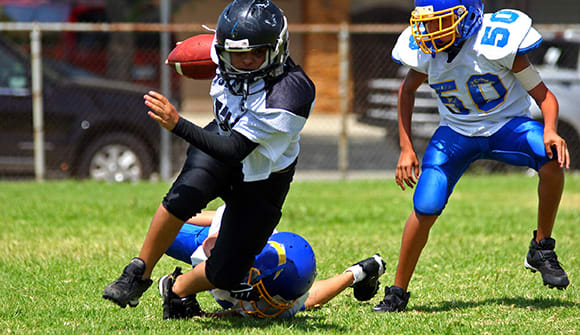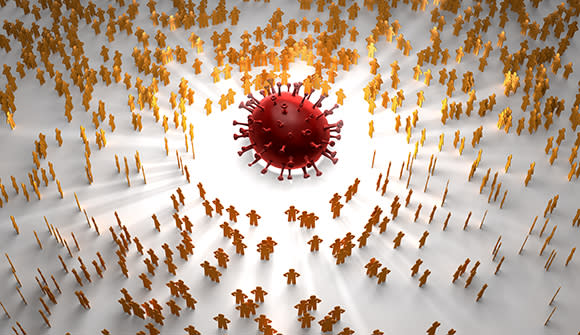Head in the game
Keeping kids concussion-free.
Article Date:

Kids' sports are back on and as the school year begins, there will be more opportunities for organized play. You know you can't keep your child in a bubble, but one of the scariest contact sport injuries to consider is any harm to the head. By learning the risks, you can teach your young athlete how to prevent a concussion.
What is a concussion?
A concussion is an injury to the brain caused by a bump, blow or jolt that makes the head move quickly back and forth, according to the Centers for Disease Control and Prevention (CDC).
"While not necessarily life-threatening, a concussion is serious because it involves the brain and, if not recognized, could lead to other more catastrophic injuries if an athlete gets hurt again," said Robert R. Sefcik, ATC, executive director of the Jacksonville Sports Medicine Program (JSMP), a volunteer-based nonprofit dedicated to youth sports safety through awareness, advocacy and injury prevention. Wolfson Children's Hospital has been a founding and sustaining partner of JSMP for nearly 40 years.
Causes of a concussion
Any blow to the head or jarring injury to the body that might also involve the skull could potentially cause a concussion.
The brain floats in fluid and moves around inside the skull whenever you shake your head. The fluid forms a cushion that protects your brain from blows, but if hit hard enough, the soft, delicate brain tissue can get damaged. Activities classified as "collision sports" – think football, basketball, lacrosse and soccer – tend to carry more risk, but concussions can happen during any activity.
You don't need direct contact to the head or loss of consciousness to have a concussion. In sports such as football, forceful body contact with the ground or another player will do. Signs of a concussion can be confusing and, to further complicate matters, sometimes young athletes don't feel any symptoms until 24 hours (or more) later.
"During the 2022-23 school year in Jacksonville, there were 144 concussions reported to and treated by high school athletic trainers. It's alarming, and there's a large percentage of concussions that are underrecognized or underreported," said Sefcik. Awareness is key to avoiding further injury.
Signs and symptoms of a concussion
Parents need to review with their kids the importance of reporting signs of concussion. Symptoms may include:
Headache
Dizziness
Sensitivity to light and/or sound
Angry, moody or irrational behavior
"Sometimes the only sign they have is they don't feel 'right,' or they feel like they're in a fog," said Sefcik.
The symptoms below – some of which may not show up for hours or days after the injury – should be checked out by a doctor immediately:
One enlarged pupil
Drowsiness or inability to wake up
A headache that gets worse and doesn't go away
Slurred speech, weakness, numbness or decreased coordination
Repeated vomiting or nausea, shaking or twitching
Unusual behavior, increased confusion, restlessness or agitation
Loss of consciousness
Any reported symptoms that seem to be worsening
"If your child has had a head injury, please be seen at the nearest Children's Emergency Center where we can evaluate for concussion symptoms and rule out more serious head injuries,” said Brian Gilligan, MD, medical director of Pediatric Emergency Medicine for Wolfson Children’s Hospital. “Our goal is to ensure the health of your child through careful evaluation and, when needed, observation in the ER, occasional head imaging and hospitalization. The health of your child is our priority."
Addressing concussions at home
"When someone has a concussion, one of the first things we recommend is for the person to 'quiet down' the eyes," Sefcik said. "The eyes and brain work together. Kids are on their phones all the time and their eyes are continuously moving and working, and that is stimulating the brain."
If your child has a concussion and is scrolling through social media while resting on the couch, but doesn't seem to be getting any better, make sure to limit screen time.
"We don't want their eyes to work too hard because then the brain will work instead of rest," Sefcik said.
While concussions are serious, most kids and teens bounce back from them just fine.
"A concussion is a common injury in sports today," Sefcik said. "Typically, a player will recover from a first-time concussion in approximately seven to 10 days, if he or she is removed from play and follows a proper recovery plan."
When is it safe to get back on the field? After receiving medical clearance from the treating physician and all symptoms are gone. Kids need to be reintroduced to their activities gradually.
Concussion prevention
If your child is participating in sports, make sure he or she:
Knows how concussions happen and when to tell an adult if he or she has been injured.
Plays on a team with safety protocols in place and a coach/organization trained in concussion-specific protocols.
Follows the rules for safety and understands why those rules exist.
Always practices good sportsmanship and watches out for other players and teammates.
Incorporates neck-strengthening exercises into his or her routine.
Wears a properly fitting helmet if appropriate for the sport, but remembers no helmet is concussion-proof.
Avoids hits to the head and uses proper techniques when the head is involved in play (such as headers in soccer).
Wears appropriate safety equipment for all practices and games.
"All it takes is injuring your brain one time and you can have long-term consequences," Sefcik said. "Protect your brain and make sure to get appropriate medical advice."
Don't let a concussion knock your child out of the game
If your child suffered a head injury and is experiencing symptoms, take him or her to the nearest Children's Emergency Center immediately. To learn more about youth sports injury awareness, advocacy and prevention in Florida, visit jaxsmp.com or contact the Jacksonville Sports Medicine Program at 904.202.4332.



